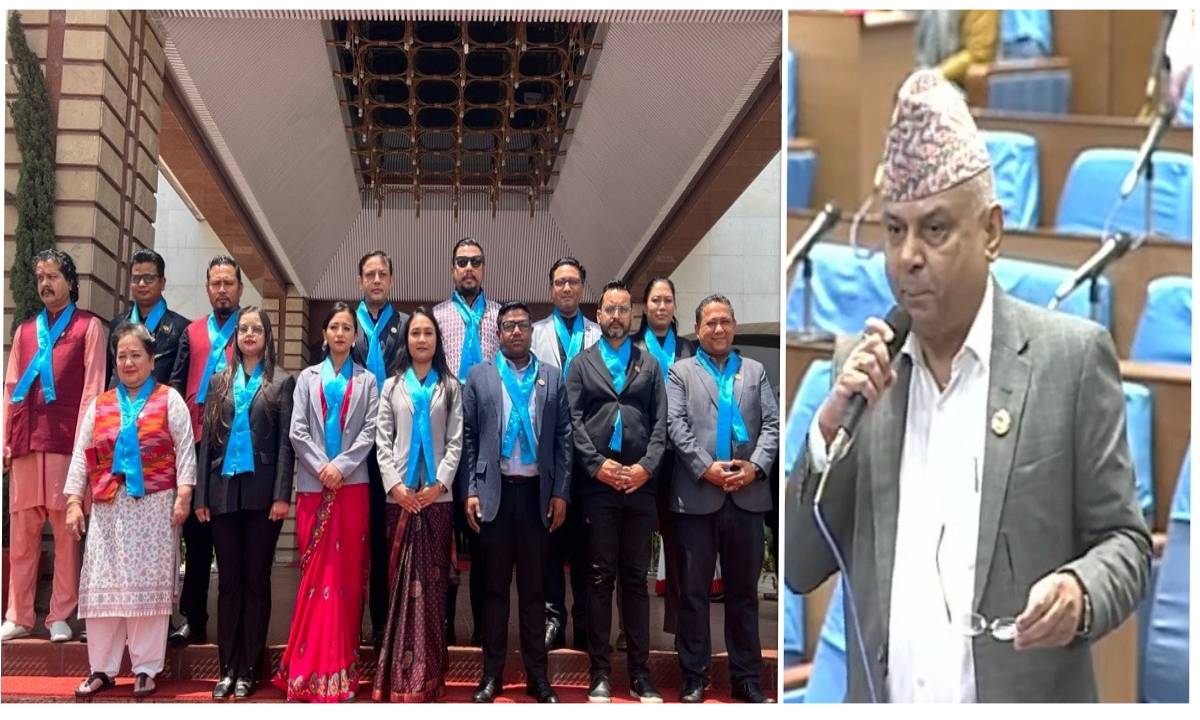KATHMANDU, Jan 22: The ruling CPN-UML expelled the party’s Vice Chairman Bhim Rawal last month and suspended two other prominent leaders, alleging that they breached the party’s discipline. While the two women leaders—Binda Pandey and Usha Kiran Timilsina—have not spoken much in public or reacted to the decision to suspend them from the party for six months, Rawal—a vocal critic of the party Chairman and Prime Minister K P Sharma Oli—has initiated a ‘Motherland Awakening Campaign, Nepal’ to create a new political force.
Adding to the controversy, the UML’s Kailali District Chapter Committee recently recommended suspending two additional leaders, Krishna Raj Subedi and Bhishma Subedi, for allegedly holding a meeting with ousted Rawal. This raises a troubling question: Is the current UML leadership intent on embracing autocratic leadership, silencing all dissenting voices within the party?
Political observers agree. “Chairman [K P] Oli was the one who fought for internal democracy within the UML for a long time. But it is ironic to see that Oli himself seems to be trying to silence the critics within the party, undermining internal democracy,” says political analyst Krishna Pokharel.
When Madhav Kumar Nepal headed the party, Chairman Oli, who then led the rival faction within the UML, fought for internal democracy. He exerted so much pressure on the top leadership that, in many cases, the top leaders were forced to correct official decisions.
Bhim Rawal’s expulsion sparks debate: Is UML embracing autocrat...

Analyst Pokharel argues that Rawal's removal from the party was a consequence of his decision to challenge Oli in the party's last general convention. “The UML has embraced People’s Multi-party Democracy, which also seeks to promote internal democracy. However, the recent action against party leaders critical of the top leadership suggests that Chairman Oli aims to suppress dissent at its roots,” he says further.
UML Vice-Chairman and Finance Minister Bishnu Poudel on Wednesday publicly defended the decision to oust Dr. Rawal from the party. "No one should be confused about Bhim Rawal. Bhim Rawal is completely anarchist. He is a person driven by personal interests," he tried to justify the decision while addressing a gathering of the party’s leading cadres in Pokhara.
The immediate reason behind the decision to expel Vice Chairman Rawal from the party has been cited as his criticism of the party’s top leadership for receiving land donated by a businessman to build the party’s headquarters. The decision on whether to receive the land donated by the businessman in question was not discussed within the party’s central committee and the standing committee. A section of leaders criticized the decision when it came to the public.
As the leaders who dare to challenge the party’s leadership are either forced to quit the party or are expelled, leaders within the UML fear that this is likely to slide the party toward the path of autocratic leadership. “Our chairman often complains that while there is absolutely no criticism of the party’s top leadership in the Communist Party of China (CPC), which has over 90 million active members, there is so much criticism of the top leadership in the party that has less than half a million active members. This clearly shows that the Chairman wants to run a one-man show in the party,” said a senior UML leader on condition of anonymity.
This is in stark contrast with the Nepali Congress (NC), where party leaders openly criticize the top leadership, yet with no consequences. While in most cases the top leadership tries to accommodate dissenting voices, those leaders are not expelled from the party just because they express different views.
UML insiders believe that the action against those speaking out against the party’s top leadership could have been prompted by the fear that there can be a ‘domino effect’ across the party’s ranks and files if leaders speaking against the leadership are spared from any action. “I see fear among party leaders within the UML that they might have to face the same fate as Bhim Rawal if they choose to speak against the party’s leadership. When no one in the party dares to speak against the wrongdoings of the party’s top leadership, the growth of the party stagnates, and people start looking for alternative political forces,” Pokharel added.
Party insiders suggest that the UML had to face a split after Madhav Kumar Nepal formed the CPN (Unified Socialist) due to the intolerant attitude of the current UML leadership toward those airing critical opinions. The party lost a significant number of leaders and cadres, who became decisive in the UML’s defeat in several constituencies in the last parliamentary election.
Following the ouster of Rawal from the party, nearly 1,100 local leaders and activists of the UML have already announced that they have quit the party, and more are set to follow suit in the Far Western Province and elsewhere in the country. The number might seem too small for the party that has several hundred thousand active members. But this might have a significant impact on the strength of the party, admit leaders within the UML.





































